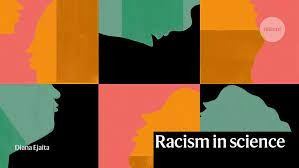The Editorial Board at Nature:
 Science is “a shared experience, subject both to the best of what creativity and imagination have to offer and to humankind’s worst excesses”. So wrote the guest editors of this special issue of Nature, Melissa Nobles, Chad Womack, Ambroise Wonkam and Elizabeth Wathuti, in a June 2022 editorial announcing their involvement. Among those worst excesses is racism. For centuries, science has built a legacy of excluding people of colour and those from other historically marginalized groups from the scientific enterprise. Institutions and scientists have used research to underpin discriminatory thinking, and have prioritized research outputs that ignore and further disadvantage marginalized people.
Science is “a shared experience, subject both to the best of what creativity and imagination have to offer and to humankind’s worst excesses”. So wrote the guest editors of this special issue of Nature, Melissa Nobles, Chad Womack, Ambroise Wonkam and Elizabeth Wathuti, in a June 2022 editorial announcing their involvement. Among those worst excesses is racism. For centuries, science has built a legacy of excluding people of colour and those from other historically marginalized groups from the scientific enterprise. Institutions and scientists have used research to underpin discriminatory thinking, and have prioritized research outputs that ignore and further disadvantage marginalized people.
In the minds of many who do not experience it day to day, racism consists of egregious acts of violence or abuse. But that is only part of what many people experience in science. It is also, in the words of Black geoscientist Martha Gilmore, a “persistent current in everyday interactions” — of belittlement, of denial of opportunity, of feeling that you do not belong.
More here.
